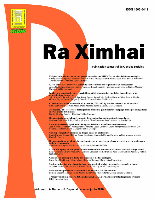
Revista Ra Ximhai
Scope & Guideline
Championing Indigenous Perspectives in Scholarly Discourse
Introduction
Aims and Scopes
- Educational Research:
The journal places a significant emphasis on educational research, particularly in the context of teacher training, curriculum development, and the challenges faced by indigenous and rural education systems. - Social Issues and Community Development:
A core focus of the journal is to address social issues impacting communities, including migration, cultural identity, and the socio-economic challenges faced by indigenous populations. - Sustainability and Environmental Education:
Revista Ra Ximhai promotes research on sustainability and environmental education, exploring how educational practices can contribute to sustainable development goals and environmental awareness. - Interdisciplinary Approaches:
The journal encourages interdisciplinary research that incorporates various methodologies and perspectives, reflecting the complexities of educational and social phenomena. - Indigenous Studies:
There is a consistent focus on indigenous studies, particularly concerning the educational experiences, cultural practices, and socio-economic conditions of indigenous communities in Mexico.
Trending and Emerging
- Impact of COVID-19 on Education:
The pandemic has catalyzed research on the challenges and adaptations in education, particularly regarding distance learning and the effects on student engagement and success. - Intercultural Education:
There is an increasing focus on intercultural education, particularly how educational practices can be adapted to respect and incorporate indigenous cultures and languages within the curriculum. - Socio-emotional Learning:
Research highlighting the importance of socio-emotional skills in education is gaining traction, emphasizing the need for educational frameworks that support mental health and emotional well-being. - Sustainable Development Goals (SDGs):
There is a growing emphasis on aligning educational practices and research with the United Nations Sustainable Development Goals, particularly in relation to environmental education and community engagement. - Research on Teacher Training and Professional Development:
Recent papers underscore the importance of effective teacher training programs that focus on innovative teaching methodologies and the professional development of educators in diverse contexts.
Declining or Waning
- Traditional Educational Methods:
Research focusing on traditional educational methods has seen a decline as the journal increasingly emphasizes innovative and technology-enhanced teaching practices. - General Economic Analysis:
Papers that broadly analyze economic factors without specific ties to educational or community impacts are becoming less frequent, possibly as the journal narrows its focus to more pressing social issues. - Historical Perspectives on Education:
There seems to be a waning interest in historical analyses of education systems, with current research prioritizing contemporary challenges and solutions. - Focused Studies on Rural Development:
While rural development remains relevant, the specific focus on traditional agricultural practices and their economic analysis is decreasing in favor of more integrated approaches to sustainability and community well-being.
Similar Journals
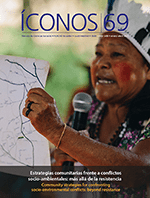
Iconos
Illuminating Latin American Perspectives on Social DynamicsIconos is a distinguished academic journal published by FAC LATINOAMERICANA CIENCIAS SOCIALES-FLACSO in Ecuador, with an ISSN of 1390-1249 and an E-ISSN of 1390-8065. Since its inception in 1997, Iconos has proudly maintained an open-access policy, promoting accessibility and dissemination of critical research across various disciplines. With a strong focus on Anthropology, Gender Studies, and Social Sciences, this journal has achieved a commendable standing, being categorized in the Q2 quartile in 2023 across multiple categories in these fields. Notably, it ranks #199 in Anthropology and #91 in Gender Studies, placing it in the upper percentiles of academic publishing. The journal aims to foster interdisciplinary dialogue and to illuminate socio-cultural dynamics through rigorous scholarship. With its commitment to quality, research diversity, and social relevance, Iconos serves as an essential resource for researchers, professionals, and students alike, seeking to engage with contemporary social issues from a Latin American perspective.

Revista Conrado
Empowering voices in academic collaboration.Revista Conrado, an esteemed academic journal published by UNIV CIENFUEGOS, specializes in a broad spectrum of topics within the field of education, social science, and cultural studies. With its commitment to Open Access publishing since 2012, the journal not only enhances the visibility of research but also fosters the dissemination of knowledge globally. Based in the vibrant city of Cienfuegos, Cuba, this journal aims to provide a platform for scholars, practitioners, and students to share original research findings, reviews, and insights that contribute to the advancement of their disciplines. As it continues to grow in both reputation and impact, Revista Conrado plays a pivotal role in nurturing scholarly dialogue and collaboration across international academic communities.

Aboriginal Policy Studies
Exploring the Complexities of Aboriginal GovernanceAboriginal Policy Studies is a pioneering open-access journal published by the University of Alberta that has been dedicated to the examination of issues, policies, and practices affecting Aboriginal communities in Canada and beyond since 2011. With its ISSN 1923-3299, this journal serves as a vital platform for researchers, professionals, and students committed to advancing knowledge and understanding of Indigenous rights, governance, and social justice. The journal aims to foster interdisciplinary discourse by publishing high-quality original research, critical analyses, and case studies that address the complexities of Aboriginal policy. Given its commitment to accessibility and rigor, Aboriginal Policy Studies is an essential resource for anyone engaged in the fields of sociology, political science, and Indigenous studies, striving to amplify Indigenous voices within scholarly dialogue.

Australian Humanities Review
Fostering Innovative Perspectives in Humanities ResearchAustralian Humanities Review is a premier journal dedicated to advancing the field of humanities research, published by the Australian National University, School of Humanities. With its ISSN 1835-8063 and E-ISSN 1325-8338, this journal serves as a key platform for scholarly discourse, featuring a variety of articles that explore diverse aspects of the humanities encompassing literature, history, philosophy, and cultural studies. Although it operates on a subscription basis, this journal is known for its rigorous peer-review process, ensuring high-quality contributions that significantly impact the academic community. The Australian Humanities Review aims to foster critical engagement and innovative thinking among researchers, professionals, and students alike, making it an invaluable resource for anyone invested in the evolving landscape of humanities scholarship. Located in Canberra, Australia, the journal reflects not only local scholarship but also global perspectives, enriching the dialogue within the field.
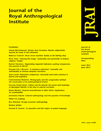
JOURNAL OF THE ROYAL ANTHROPOLOGICAL INSTITUTE
Connecting Scholars to the Heart of AnthropologyJOURNAL OF THE ROYAL ANTHROPOLOGICAL INSTITUTE, published by Wiley, stands as a prestigious platform for scholarly discourse in the field of anthropology. With an ISSN of 1359-0987 and an E-ISSN of 1467-9655, this journal has been a vital resource for researchers, professionals, and students since its inception, featuring contributions that push the boundaries of understanding in both cultural and social anthropology. The journal’s rigorous peer-review process affirms its high academic standards, reflected in its top-tier Q1 rankings in both the Anthropology and Arts and Humanities categories for 2023. With a current ranking of #78 out of 502 in Social Sciences Anthropology and #138 out of 552 in Miscellaneous Arts and Humanities, it inhabits a critical space within academia, addressing seminal issues and innovative research. While the journal is not open access, it remains accessible to those affiliated with institutions that provide subscriptions, ensuring that groundbreaking anthropological insights are disseminated widely within the academic community. As it converges from 1995 to the present, the JOURNAL OF THE ROYAL ANTHROPOLOGICAL INSTITUTE continues to shape the landscape of anthropological research, engaging a diverse readership eager to explore the intricate tapestry of human cultures.
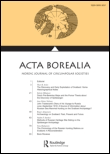
Acta Borealia
Connecting Cultures Through Rigorous ResearchActa Borealia is a prestigious academic journal published by ROUTLEDGE JOURNALS, TAYLOR & FRANCIS LTD, based in the United Kingdom. Since its inception in 1984, the journal has established itself as a vital platform for scholarly discourse in the fields of Anthropology, Cultural Studies, History, Sociology, and Political Science. With a commendable impact factor and placement in Q1 and Q2 quartiles across various categories, it demonstrates a strong commitment to high-quality research and innovative contributions. The journal is well-ranked in Scopus metrics, highlighting its influence and reach within the arts and humanities as well as social sciences. Acta Borealia publishes original research articles, reviews, and critical essays, making it an essential resource for researchers, professionals, and students alike seeking to enhance their understanding of northern studies and related fields. While securing access may require institutional login or subscription, the journal's rich content continues to foster interdisciplinary discussions that are critical for navigating complex social issues.
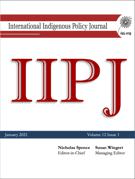
International Indigenous Policy Journal
Fostering Dialogue on Global Indigenous IssuesInternational Indigenous Policy Journal, published by University of Western Ontario, serves as a pivotal platform in the fields of Anthropology, Cultural Studies, and Sociology and Political Science. Since its inception in 2010, this Open Access journal has championed the dissemination of scholarly works that advance the understanding and implementation of indigenous policies globally. Operating from the esteemed academic setting of London, Ontario, Canada, it has solidified its reputation, as evidenced by its impressive category quartile rankings, notably achieving Q1 status in Cultural Studies and Q2 rankings in both Anthropology and Sociology/Political Science in 2023. Researchers, professionals, and students can find exceptional insights within its pages, as it ranks in the top percentiles for its respective fields, reflecting its crucial role in influencing contemporary dialogues surrounding indigenous issues. With a commitment to inclusive scholarship, International Indigenous Policy Journal continues to be an essential resource for those dedicated to understanding and supporting indigenous communities and their policy contexts.

World
Navigating the Complexities of Our Global LandscapeWorld, published by MDPI, is a leading open-access journal that has been dedicated to the interdisciplinary study of global issues since its inception in 2020. With its focus on diverse topics that impact humanity—from environmental challenges to socio-economic developments—the journal caters to a wide audience of researchers, professionals, and students engaged in the pursuit of knowledge across various disciplines. Although the journal’s precise scope and HIndex are currently not specified, it aligns itself with MDPI's commitment to quality and accessibility in scientific publishing. The journal is hosted in Switzerland, ensuring global reach and collaboration. As an open-access publication, World guarantees that all content is freely available, promoting broader dissemination of ideas and research findings. This enhances its significance in the academic community, allowing for a diverse range of contributions that illuminate the complexities of our interconnected world.
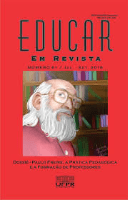
Educar em Revista
Exploring innovative practices in the realm of education.Educar em Revista is a leading academic journal dedicated to the field of education, published by EDITORA UNIV FEDERAL PARANA, CENTRO POLITECNICO. With an ISSN of 0104-4060 and E-ISSN 1984-0411, this prestigious journal has been an Open Access platform since 2006, ensuring that its valuable research is accessible to a global audience. Situated in the vibrant city of Curitiba, Paraná, Brazil, it aims to promote critical discussions and innovative research in educational practices, theories, and policies. As an essential resource for researchers, professionals, and students alike, Educar em Revista strives to contribute to the advancement of education by disseminating high-quality articles that explore contemporary issues and emerging trends in the field. Its commitment to open access enhances its reach and impact, making it a pivotal resource for those dedicated to driving educational change and improvement.
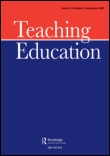
Teaching Education
Shaping the future of education with scholarly contributions.Teaching Education, published by Routledge Journals, Taylor & Francis Ltd, is a pivotal journal in the field of educational studies, with an ISSN of 1047-6210 and an E-ISSN of 1470-1286. Established in the United Kingdom, this journal has significantly contributed to the discourse on educational theory and practice since its inception in 1987, with a focus on research that enhances teaching methodologies and promotes effective learning environments. With a commendable Scopus rank of 419 out of 1543 in the Social Sciences - Education category, placing it in the 72nd percentile, it attracts a diverse range of scholarly contributions that elevate the quality of education worldwide. Although it does not offer open access, Teaching Education remains an essential resource for researchers, educators, and policy makers interested in the latest developments and insights in educational practices, making it a valuable addition to any academic library.